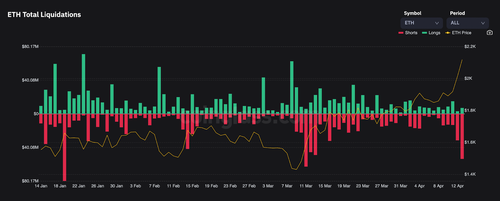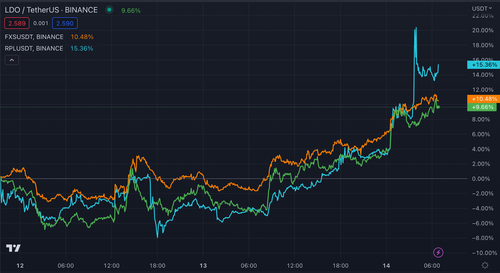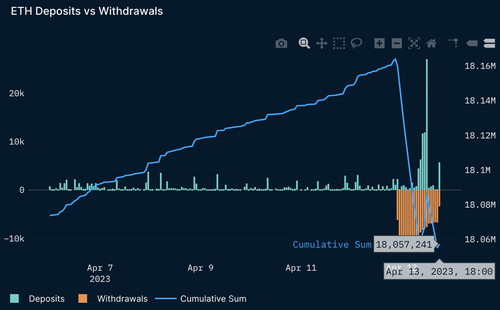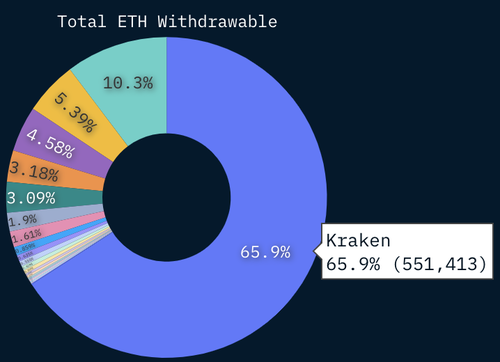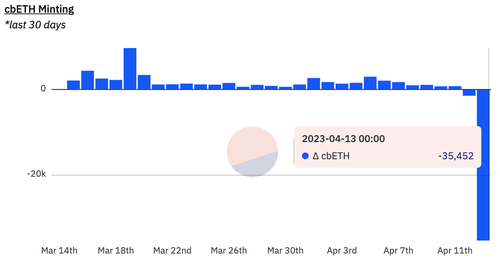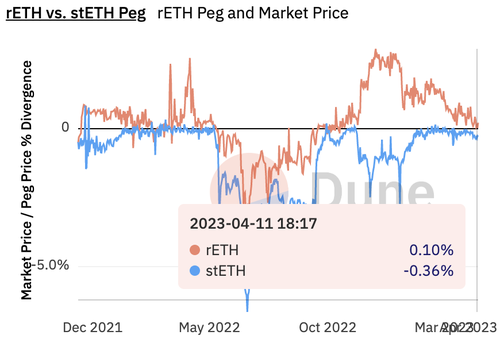Analyzing Ethereum’s Big Week
Authored by Ben Giove and Jack Inabinet via Bankless.com,
How did crypto markets react to Shapella?
We now live in a post-Shapella world!
One of the largest upgrades in Etheruem’s history officially arrived this week, with Shapella completing Ethereum’s transition to Proof-Of-Stake (PoS) by enabling withdrawals from staking. Leading up to the event, there was rampant speculation on how the upgrade would impact the markets, the staking landscape and DeFi.
In one corner you had the bulls, who felt that the upgrade represented a significant de-risking event for ETH, believing that the removal of the technical risk around withdrawals would lead to an influx of users who would buy-and-stake.
In the other camp, you had the bears, who thought that Shapella represented a major supply overhang for ETH, believing that mass withdrawals would lead to persistent sell pressure on the asset.
Who was right? Let’s dive in.
Market Reaction
It’s been under 48 hours since Shapella hit mainnet, but so far it certainly seems to be a “bullish unlock.”
ETH has roared since the upgrade went live, surging 13.1% from $1871 to $2117 at the time of writing.
[ZH: ETH’s underperformance is most clear when judged against BTC into and out of the fork…]
This move has left a trail of bear carcasses in its wake, leading to more than $84.7M worth of short liquidations between April 12-13. This is the most we’ve seen in a two-day period since March 12-13, when ETH rallied in the wake of the USDC de-peg and banking crisis.
Source: CoinGlass
Ethereum ecosystem tokens have experienced monster rallies since Shapella, with – unsurprisingly — staking-related tokens leading the charge.
This includes liquid-staking derivative (LSD) governance tokens, with Lido (LDO), Rocket Pool (RPL), Frax (FXS) and StakeWise (SWISE) surging 14.3%, 17.1%, 12.9% and 19.2% respectively at the time of writing. LSD-Fi protocols have also soared, with Pendle (PENDLE) rallying 19.9%, Flashstake (FLASH) ripping 47.1% and unshETH (USH) mooning 56.1%. Layer 2 tokens have also surged on the back of the move in ETH, with Arbitrum (ARB), and Optimism (OP) rallying 30.8% and 18.0%.
Source: TradingView
These monster moves suggest that fears of a post-Shapella dump were overblown. Instead, early signs point towards those in the bullish de-risking camp being in the right, as the upgrade has been treated as a buy-the-news event.
Withdrawal Activity
Outflows have overpowered deposits and the Beacon Chain has seen 106k in net Ether outflows since Shapella went live. While the impacts of Shapella are just beginning to be felt, it appears prophecies of catastrophe were overblown.
Source: Nansen
Ethereum’s exit queue is live and full of stakers looking to withdraw. At the time of analysis, there was 827k ETH across 23k validators in the queue, representing 4.1% of the validator set.
Kraken represents the vast majority of exits (65.9%) as its settlement with the SEC required the shuttering of US staking operations. A majority of these clients (likely proportional to other providers), however, will probably re-stake as the settlement did not alter the underlying benefits of ETH staking.
Source: Nansen
At the current validator count and given exit queue constraints, a maximum of 1.8k validators can exit per day. All present exit requests can be processed within 14 days from the publication of this article, a far cry from ETH doomers’ calls for months of withdrawals.
Bankrupt crypto lender Celsius has 158k staked ETH not included in the exit queue at the time of analysis. The need to liquidate this position to repay creditors means withdrawals are inevitable.
All things the same, less Kraken’s withdrawals and inclusive of Celsius’s withdrawals, 2.3% of ETH staked can be expected as net outflows from full withdrawals. Partial withdrawals are the largest source of potential outflows, with 877k in accrued consensus rewards waiting to be automatically withdrawn at the time of analysis. Nearly 70% of these rewards, however, belong to validators with type 0x00 credentials and cannot be withdrawn until upgraded to type 0x01 credentials. Stakers have been long aware they need to upgrade credentials prior to withdrawing, so it is unlikely we see a significant number of validators upgrade their credentials in the immediate term, limiting staking outflows from partial withdrawals.
DeFi Activity
Solo validators and Staking-as-a-Service products gained liquidity on stake, however, for many LSD protocols, absolutely nothing has changed post-Shapella.
Liquid-staking heavyweight Lido, for example, will not have withdrawals enabled until May at the earliest, pending deployment to testnet and the completion of several outstanding security audits. An inability to withdraw means outflows from liquid-staking are a non-factor at present. However we currently anticipate larger players like Lido to lose market share to smaller protocols as altruistic stakers move to decentralize network security and new LSD-Fi projects spin up token incentives for their product offerings in the coming months.
Coinbase’s staking program, which allows users to mint their cbETH staking derivative, is the exception, with redemptions of over 35.5k cbETH for users following Shapella. Coinbase makes up 10.3% of the exit queue, representing a further 86k in full Ether withdrawals. Included in this calculation, however, is withdrawals for products beyond LSDs, like institutional staking.
Source: Dune Analytics
DeFi borrower demand for liquid-staking derivatives has been virtually non-existent.
Aave’s stETH market has continued its downward rate spiral, with utilization hovering slightly under 13%. Lenders are currently earning under 10 bps and borrowers are paying 28 bps on the protocol’s Ethereum V3 market. Lending activity on Compound is similarly depressed, with utilization of the ETH market at 54.6%, well below the targeted 90% utilization kink point, above which borrowing rapidly becomes prohibitively expensive.
Total collateral lent to and borrowed from Compound’s ETH market has also fallen precipitously since the start of April, down 33.4% and 34.9%, respectively. Lending and borrowing rates on the platform have plummeted as well, down from 2.21% to 1.46% and 5.01% to 3.65%, respectively, over the same period.
LSD stableswap pools have remained relatively… stable, however, we are seeing some early indications of stETH sell pressure, in line with our beliefs that stake will be redistributed from Lido.
Balancer’s wstETH/sfrxETH/rETH (41.0% wstETH) and wstETH/cbETH (56.6% wstETH) pools, in addition to Curve’s wETH/stETH concentrated pool (64.5% stETH), are all indicating outsized sell pressure on Lido’s staking derivative. Further evidence for this thesis can be found in stETH’s deviation from peg. Currently, stETH is trading at 0.36% discount, compared to a 0.10% premium for rETH, testing the lower bound established after March’s banking crisis.
Source: Dune Analytics
Should Lido’s competitors be successful at draining its TVL, this results in a near-term steepening of stETH’s discount. Absent withdrawals, the underlying ETH remains illiquid, leaving sale as the sole substitute for redemption.
A Busy 48 Hours
As we can see, both the market and on-chain participants have been keeping busy post-Shapella.
Prices have surged with ETH rallying above $2100, carrying liquid-staking, LSD-Fi, and L2 tokens along with it. Although early, this rally seems to suggest that the event was a de-risking one, rather than the source of torrential sell pressure that some had feared.
We can also see that there have been net-outflows since the upgrade went live, led in large part by CEXs like Kraken and Coinbase.
Shapella has also begun to impact the LSD market, with cbETH being hit with more than 35K in redemptions while Lido’s stETH is trading below peg. This suggests that we may be in the early stages of seeing the anticipated migration of deposits away from large stakers like Coinbase and Lido.
Yes, it hasn’t been very long since Shapella went live – but its effects on the on-chain economy are already beginning to be felt.
Tyler Durden
Fri, 04/14/2023 – 19:00
Zero Hedge’s mission is to widen the scope of financial, economic and political information available to the professional investing public, to skeptically examine and, where necessary, attack the flaccid institution that financial journalism has become, to liberate oppressed knowledge, to provide analysis uninhibited by political constraint and to facilitate information’s unending quest for freedom. Visit https://www.zerohedge.com



